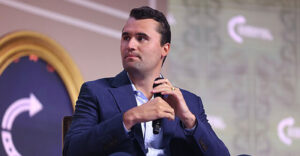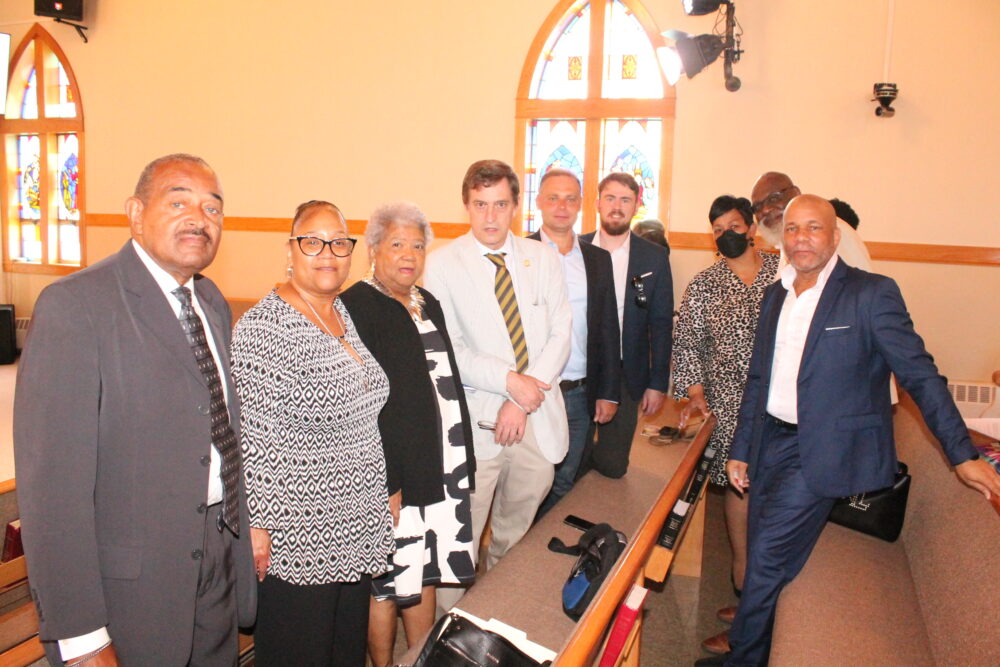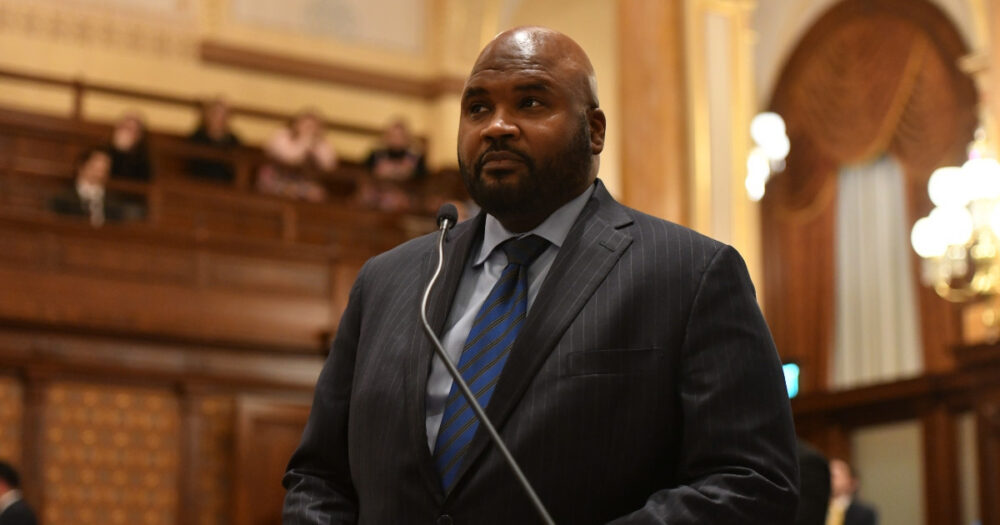The tone of the typical isolation postcard is sunny, insistent and aspirational as a holiday greeting: “Thanks to everyone who sent well wishes for @VP,” wrote Doug Emhoff, the second gentleman, on Twitter. “She is feeling good and is working from home.”
Like so many Americans, Vice President Kamala Harris got COVID-19 in late April. Like so many Americans, she worked right through it, seated at her desk surrounded by the signifiers of productivity: binders, pens, pastel Post-it notes. Other COVID-positive political figures assured the public they, too, were forging ahead on their to-do lists: Jen Psaki, Gavin Newsom. Donald Trump, when he had COVID-19, posed for his own working-through-it photos, though he appeared to be signing a blank sheet of paper.
Advertisement
In the world’s only wealthy country that does not guarantee paid sick leave, just working through it — even for those who could take paid time off — is the norm.
“I’m trying to work out in my head why I had that thought of, ‘Oh, I’ll work through it,’” said William Fitzgerald, 36, who runs a strategy firm. He got COVID-19 in late April and took meetings throughout his illness. “Why didn’t I just rest for the week?”
Advertisement
Working while sick is an American pastime — one that a vicious pandemic, which sickened millions, somehow didn’t disrupt. Over 100 other countries guarantee some form of paid sick leave. In the United States, a survey of 3,600 hourly workers this spring found that two-thirds of those who had been sick with COVID-19 or other illnesses went to work while sick, according to the Shift Project at Harvard, a research project on work scheduling. Many of them cited fear of getting in trouble with their managers, or financial pressures.
Some 33 million Americans don’t have paid sick leave. Low-income workers are far less likely to be able to take time off when they’re sick; just over half of people in the bottom quarter of wages get paid sick leave, compared to 94% in the top quarter.
But even salaried workers who have paid leave often don’t use the time that they’re allotted. Americans in private industry get an average of seven sick days per year. A survey of large employers, by Mercer, found that nonhourly workers used just half of their sick days in 2021. This number was virtually unchanged from before the pandemic, in 2018, which Mercer analysts attribute partly to the prevalence of sick people working from home. In other words, for some people COVID-19 did away with the sick day instead of reinforcing it.
“There is this culture that everyone around you is working, so you feel obliged to go along with it,” Fitzgerald said. “The most important value in America seems to be how much money is in your bank account, and I think that’s what drives so much of working through sickness.”
Fitzgerald, who is still fatigued from his bout of COVID-19, designed generous time off policies for his own staff: unlimited sick days, a minimum of 25 vacation days. But when he came down with chills in late April, and tested positive for coronavirus, he couldn’t bring himself to take advantage of that paid time off. After all, it was a high-pressure week at work, with client calls on top of a staff retreat.
So Fitzgerald pressed through video meetings, and even invited his team to sit in his yard while he wore a mask so that he wouldn’t miss out on their time for in-person collaboration.
“I don’t think it sent a nice signal to the people who work for me,” he said.
By the time he was two weeks into his illness, cramming each day with 20 calls, he felt like collapsing. He logged off one client meeting, got in bed and slept from 1 to 7 p.m.
Advertisement
In an office, workers said, it is sometimes easier to delineate the boundary between work days, which meant coffee and commutes, and sick days, which meant chicken soup.
“You’d go to the doctor and you’d get a note and they’d be like, ‘You can take off three days,’” Fitzgerald said. “It would be very much like ‘them’s the rules, we gotta obey them.’”
But those don’t seem to be the rules now. Why do people stay plugged in even when they’re aching, coughing, feverish — and have paid time off? With many people now vaccinated, a positive coronavirus test is sometimes treated with a shrug, even with the virus still surging.
Some office workers said they can’t shake the sense of guilt formed by a system that makes productivity seem like a virtue, the same system that tolerates a lack of legally mandated paid sick leave.
James Carr, 38, a data scientist, who got COVID-19 in February and worked through it, remembered being chided for trying to use his sick days at a previous job because of a looming deadline. A.Z. Madonna, 28, a music journalist, got COVID-19 recently, and couldn’t silence the voice in her head asking why she wasn’t getting anything done.
“I’ve definitely had managers who with one minute are encouraging me to actually take a break, but they’re still responding to emails when they’re on vacation or sick,” Madonna said. “It might be a bit of a ‘do as I say, not as I do’ kind of thing.”
Advertisement
Many workers find themselves, consciously or not, mimicking the way their bosses behave. They witness managers answering emails from bed, and feel they should do the same.
So some bosses are taking a firmer line on using their leave. Jim Canales, head of the Barr Foundation, a philanthropic organization focused on arts, education and climate, got COVID-19 about a month ago. Canales spent the past two years urging his team to take care of themselves, and he knew that working through his illness would undermine that message. He sent out a morning email to his staff noting that it was Friday the 13th, Mercury was in retrograde and he had tested positive for COVID-19 — and wasn’t planning to be available for meetings or emails.
“I can’t preach a message of self-care for two years and then behave in a different way,” he said.
Canales refashioned his organization’s sick leave policies during the pandemic, with the aim of encouraging employees to actually make use of their time off. He relabeled sick days as health days, so workers know they can be used to take care of family members, too. That health leave was also made unlimited, so nobody felt the pressure to save it up for the future.
But even as some employers are encouraging workers to use their time off, many others are dropping benefits introduced during the pandemic. This spring, Amazon announced a return to its pre-pandemic sick leave. Walmart stopped offering emergency paid leave for most of its workers with COVID-19 at the end of March, instead asking employees to use their regular bank of paid time off and sick days.
Some argue the disappearance of sick days is preventing them from making full recoveries. Angela Lewis, who works at a speakers bureau, tested positive for coronavirus last month, along with the rest of her household. Her son stayed home from school and her husband, who is self-employed, slept. Lewis, meanwhile, dropped a note in Slack to say she had COVID-19 and then forged through her standard workweek, though her congested head felt like it weighed 100 pounds.
Advertisement
“Some people kind of have a badge of honor, like ‘Yeah, I worked through it, it was fine,’” she said. “Ultimately, I could say I did the same.”
“I didn’t have a fever, so I felt obligated to work through it,” she added, noting that she does have paid time off that she didn’t use. “But then I felt annoyed about feeling obligated.”
And even some of those managers most vocally committed to rest and recovery are struggling to accept their own advice.
“I’m talking about this in hindsight, what I’ve learned, but I’m still at work this week trying to move through it,” said Fitzgerald, who said he does not feel that he has fully recovered.
A day later, he called back with an update: He’d decided to take one day off.
c.2022 The New York Times Company







